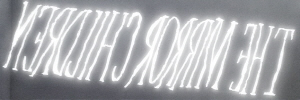I’m compiling a personal list of movie moments that have made a deep impression on me over the years. Some of them are funny; others are poignant or just strange. Some are fleeting seconds or mere transitions. A number of them have, in one way or another, influenced the creative process of The Mirror Children.
Lost in Translation: Scarlett Johansson alone in a Tokyo hotel
In fifty-three seconds of footage this scene exquisitely encapsulates idea of a woman objectifying and considering her solitude. Charlotte sits on the window sill and observes the Tokyo skyline to the accompaniment of Tommib by Squarepusher. Perfect in its simplicity, it represents the impeccable marriage of music and image. In this fleeting moment we are connected with Charlotte in her patient journey of understanding loneliness. For me, no other film has ever managed to instil such an urgent sense of empathy for a character in such a beautifully subdued way.
The opening title sequence of Se7en
Spring 1996: I was studying in Valencia, Spain, with some friends. We had found a cinema which showed a double bill of movies every Wednesday for only 300 pesetas (about £1.50). The first film finished and we went out to the lobby to eat our sandwiches. When we came back in we were greeted by this. I don’t think I have ever seen an opening title sequence which made such a powerful statement of intent. It was all the more ominous given the fact that we were about the only cinemagoers in one of those grand old, velour-curtained halls reminiscent of the Haymarket in London. Having heard the commentary on the DVD, I realise now that the photography of the writing was painstaking. This opening sequence was always in my mind when I visualised the mirror writing for the cover of the novel.
The library scene from Se7en
When I was chewing over the idea of children exploring a (potentially ominious) mirror world and spending years in the Replica reading books, I had this scene in the back of my mind. In a film that is largely characterised by violent imagery, this scene is an island of relative calm. However, the beauty of Bach’s accompanying Air on the G String deepens the sense of disquiet as the images from Dante’s Divine Comedy pass before the viewers’ eyes. If a film was ever made of The Mirror Children, it would be incredible if the sense of foreboding in this scene could be distilled and used in scenes within the Replica. It seems self-indulgent to externalise these hopes but, well… you never know.
The mad watch scene from Disney’s Alice in Wonderland
I’ve always thought that Alice in Wonderland is one of Disney’s greatest triumphs and I’ve never understood why it had rather mediocre reviews. For obvious reasons the story of Alice has influenced The Mirror Children, but I just love the insanity of this moment from the movie.
Danny’s tricycle from The Shining
Here is – perhaps – the ultimate in tracking shots: Danny’s tricycle from The Shining. for me, it’s an example of how the most mundane of activities can be instantly transformed into something fascinating. I especially love the switch from the high angle track to the low angle when the camera is drawn to the tricycle, and the sound of the wheels moving from carpet to parquet. Sharing has been disabled for this video, so you’ll have to follow the link above to see it.
The basement scene from Zodiac
Another David Fincher classic, this scene features Jake Gyllenhaal interviewing a suspect of the Zodiac killings and – against his better judgement – going down to the basesment with the suspect. David Fincher has an extraordinary capacity to create tension with minute details such as the almost inaudible creaking sounds from the floorboards above and the shot of the suspect in the shadows at 2:08. Within the context of the movie, this scene is incredibly claustrophobic.
